Boiler Installation Brimington
Top Boiler Installation in Brimington
Receive up to 3 Boiler Replacement quotes for your project today! Compare profiles, reviews, accreditations, portfolio, etc... and choose the best offer.
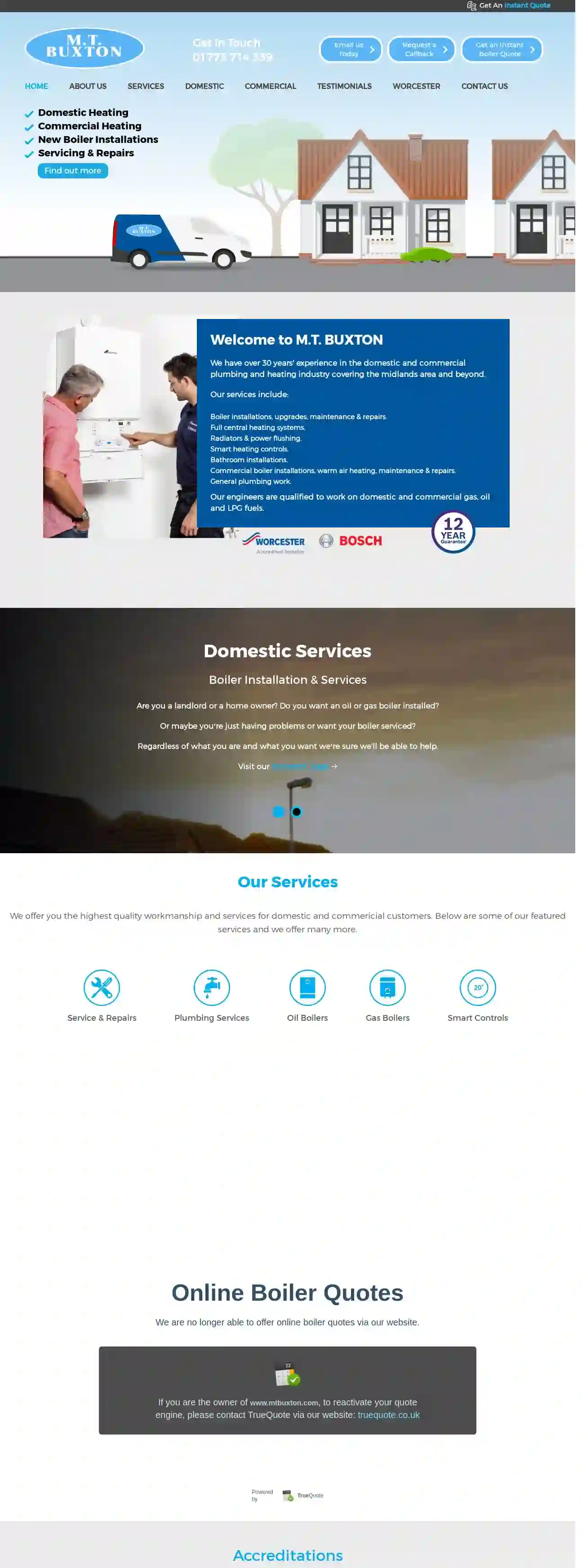
M T Buxton Plumbing & Heating
423 reviewsLangley Mill, 237-241 Station Road, Nottingham, NG16 4AD, GBM.T. Buxton Plumbing & Heating is a company with a structured management team which has a wealth of experience on a variety of domestic and commercial work. We have a solid client base reflecting the twenty four years the company has been in existence and as any reliable contractor we are always seeking to expand and develop. Our client list currently includes the Co-Operative Group, Sandicliffe Motors and Repton School to name just a few. We are confident and well able to meet the demands in providing both quality and competitive quotations for a wide spectrum of domestic and commercial work. We are adequately staffed to handle a wide range of contracts from domestic works up to the multi-disciplined service installations associated with larger projects. The company's Senior management, and the assigned contracts engineer, closely monitor the installations to maintain our high standard of workmanship, working closely with all of our directly employed labour force. Our company strategy pursues contracts throughout the UK which would include installation work, planned and reactive maintenance. We trust this proves of sufficient interest and we would welcome any enquires either by our contact page.
- Services
- Why Us?
- Accreditations
- Gallery
Get Quote
TitanFlameltd-Glossop
51 reviews175 High St W, Glossop, SK13 8HJ, GBTitan Flameltd is a local plumbing emergency call out service with over 20 years of experience in plumbing and heating. We strive to complete every job with the highest skill and best customer service. Our team of emergency plumbers and heating engineers are available 24/7 to provide fast, reliable solutions. We offer a range of services including appliance installation, bathroom plumbing, emergency plumbing, immersion heaters, kitchen plumbing, outdoor plumbing, tap repair and install, pipe repair, boiler installation and repair, water heater installation and repair, radiator installation and repair, gas line installation and repair, furnace installation and repair, heat pump installation and repair, drain cleaning, plumbing repairs, pipe installation and repair, water treatment, and sewer line repair and replacement. We are available 24/7 and offer quick appointments, fast, efficient services, and expert support when you need it most.
- Services
- Why Us?
- Gallery
Get Quote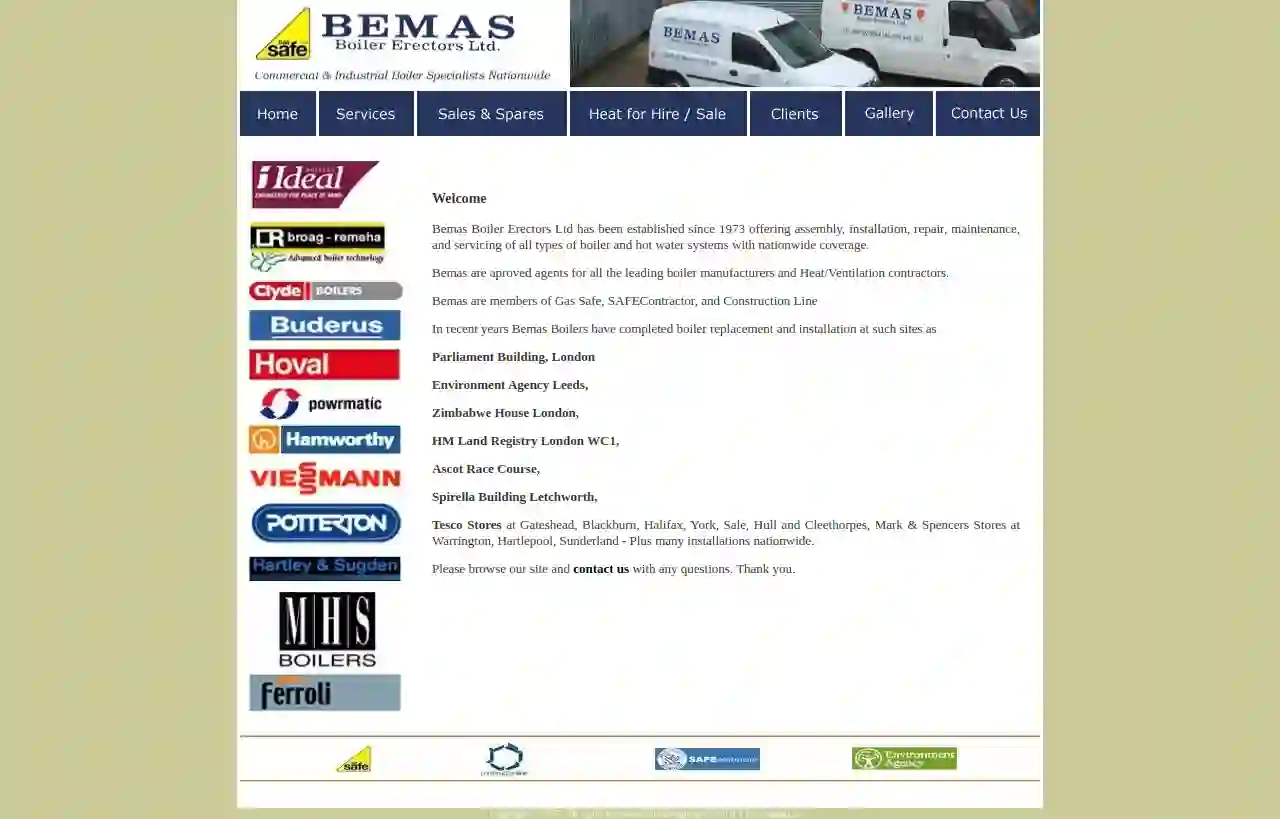
Bemas Boilers Ltd
Cilfton Avenue, Long Eaton, NG10 2GA, GBBemas Boiler Erectors Ltd has been established since 1973 offering assembly, installation, repair, maintenance, and servicing of all types of boiler and hot water systems with nationwide coverage. Bemas are approved agents for all the leading boiler manufacturers and Heat/Ventilation contractors. Bemas are members of Gas Safe, SAFEContractor, and Construction Line. In recent years Bemas Boilers have completed boiler replacement and installation at such sites as Parliament Building, London, Environment Agency Leeds, Zimbabwe House London, HM Land Registry London WC1, Ascot Race Course, Spirella Building Letchworth, Tesco Stores at Gateshead, Blackburn, Halifax, York, Sale, Hull and Cleethorpes, Mark & Spencers Stores at Warrington, Hartlepool, Sunderland - Plus many installations nationwide. Please browse our site and contact us with any questions. Thank you.
- Services
- Why Us?
- Gallery
Get Quote
Complete Cooling Services Ltd
524 reviewsUnit 4a, Huss's Lane, Long Eaton, NG10 1G, GBComplete Cooling Services is a local HVAC engineers company providing the best services for heating, ventilation & air conditioning. With over 107 years of combined industry experience and knowledge, our team of highly trained and skilled HVAC engineers deliver exceptional services. We provide a seamless and reliable service when it comes to your HVAC systems installation, maintenance and repairs. Our services include air conditioning installation, repairs, service & maintenance, planned preventative maintenance, and more. We are a local company dedicated to ensuring that all of our customers get the very best service and support when it comes to their air conditioning and comfort cooling requirements.
- Services
- Why Us?
- Our Team
- Gallery
Get Quote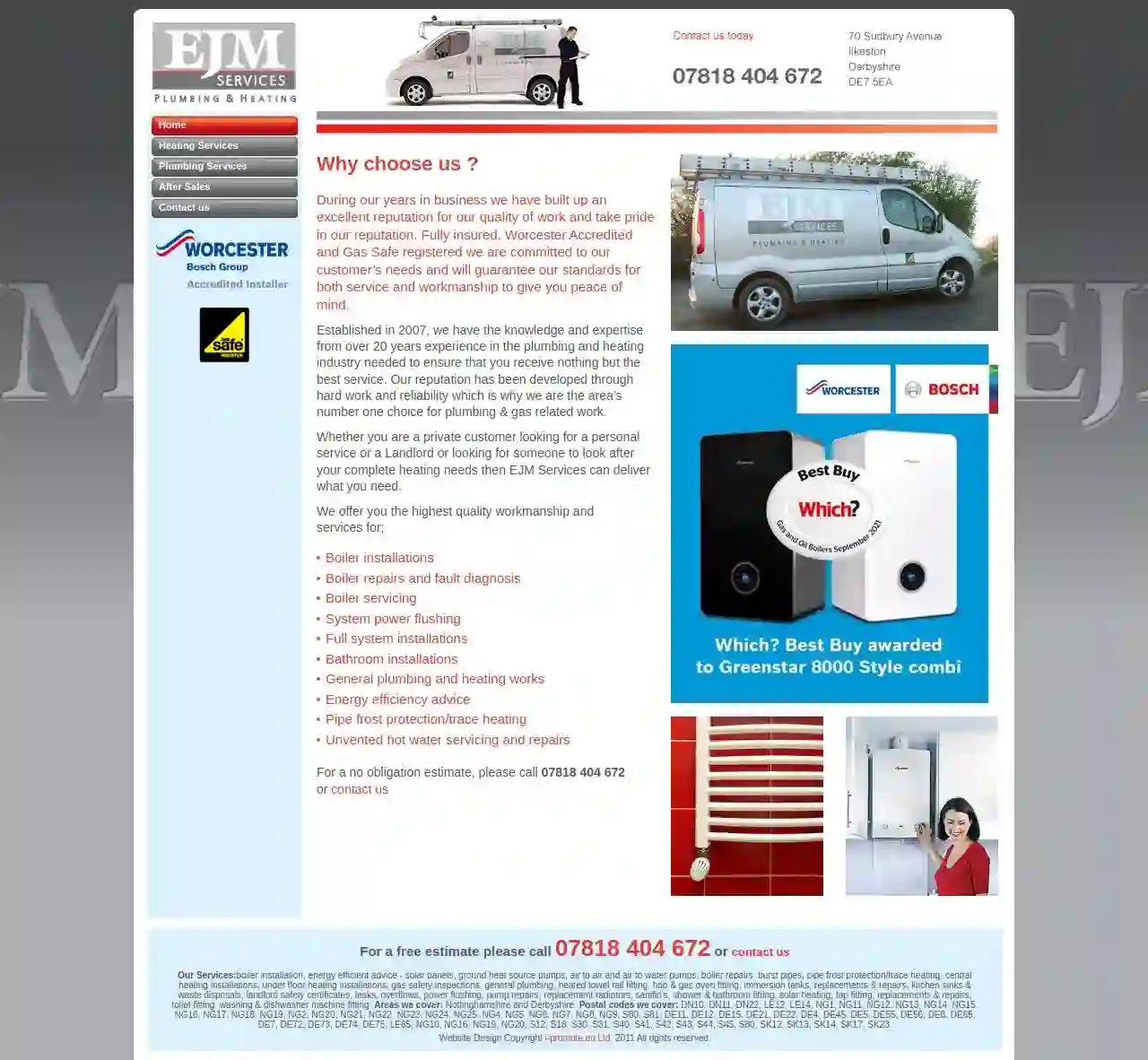
EJM Services
52 reviews70 Sudbury Avenue., Ilkeston, DE7 5EA, GBDuring our years in business we have built up an excellent reputation for our quality of work and take pride in our reputation. Fully insured, Worcester Accredited and Gas Safe registered we are committed to our customer’s needs and will guarantee our standards for both service and workmanship to give you peace of mind. Established in 2007, we have the knowledge and expertise from over 20 years experience in the plumbing and heating industry needed to ensure that you receive nothing but the best service. Our reputation has been developed through hard work and reliability which is why we are the area’s number one choice for plumbing & gas related work. Whether you are a private customer looking for a personal service or a Landlord or looking for someone to look after your complete heating needs then EJM Services can deliver what you need.
- Services
- Why Us?
- Accreditations
- Gallery
Get Quote
Trane UK
51 reviewsSwadlincote, GBTrane is a leading global provider of indoor comfort solutions and services. Our innovative products and services help buildings and processes work more efficiently, sustainably, and effectively. With a portfolio of energy-efficient HVAC systems, rental solutions, and services, we help customers achieve their goals and reduce their environmental impact. Our solutions are designed to meet the unique needs of various industries, including office buildings, data centers, healthcare, hospitality, chemicals and pharmaceuticals, retail, food and beverage, and district heating and cooling.
- Services
- Why Us?
- Gallery
Get Quote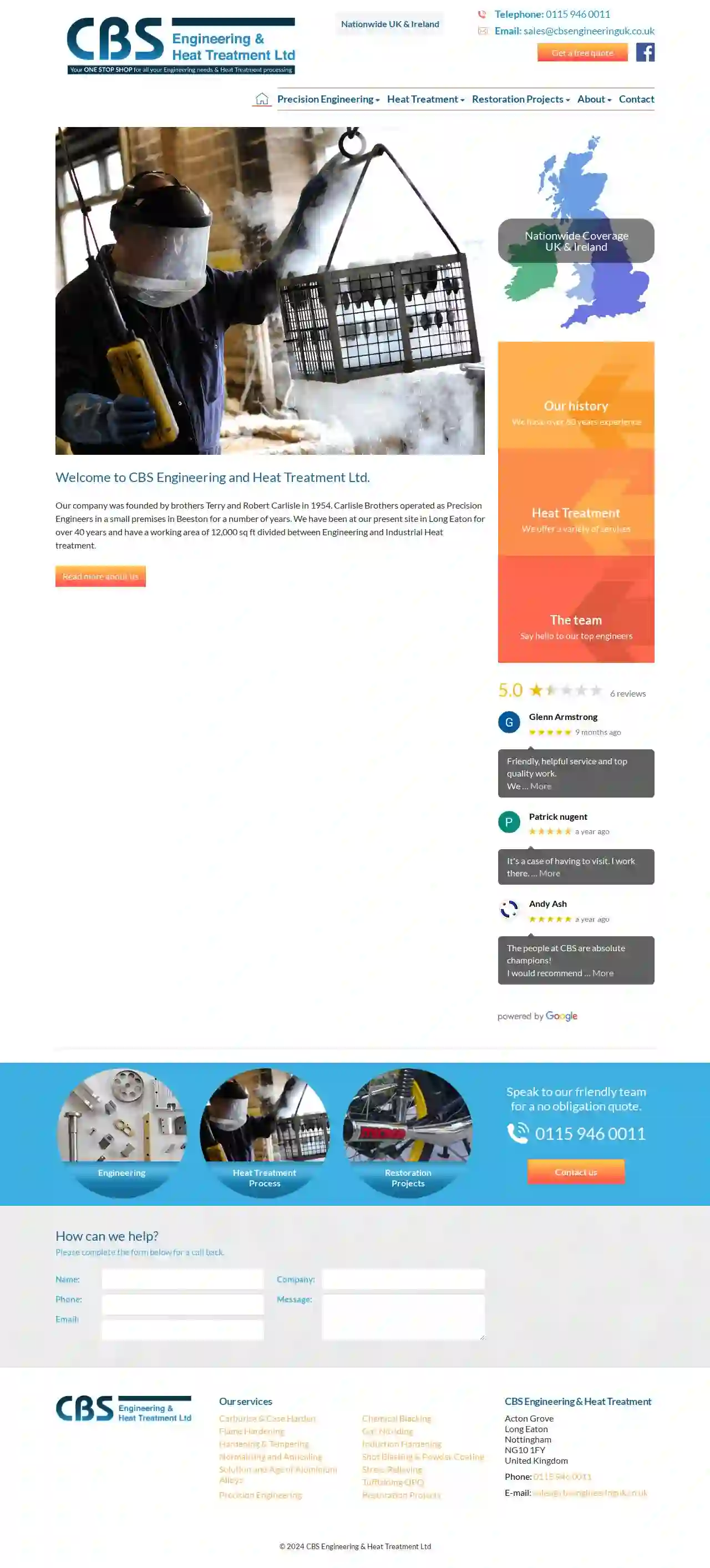
C B S Engineering and Heat Treatment Ltd
56 reviewsLong Eaton, Nottingham, Acton Grove, NG10 1FY, GBWelcome to CBS Engineering and Heat Treatment Ltd. Our company was founded by brothers Terry and Robert Carlisle in 1954. Carlisle Brothers operated as Precision Engineers in a small premises in Beeston for a number of years. We have been at our present site in Long Eaton for over 40 years and have a working area of 12,000 sq ft divided between Engineering and Industrial Heat treatment. Read more about us. Nationwide Coverage UK & Ireland. Our history We have over 60 years experience. Heat Treatment We offer a variety of services. The team Say hello to our top engineers.
- Services
- Why Us?
- Our Team
- Testimonials
- Gallery
Get Quote
GasCare
4.9539 reviewsGlossop, GBGasCare is a trusted partner for all your home heating needs. We offer a range of services, including boiler installation, repair, servicing, and smart heating solutions. Our team of experienced engineers is dedicated to providing prompt and reliable service, ensuring your home is warm and comfortable year-round. We understand that a faulty boiler can be a major inconvenience, which is why we offer 24-hour emergency call-out services. We also provide free energy audits to help you save money on your energy bills. At GasCare, we're committed to making your life easier when it comes to heating your home.
- Services
- Why Us?
- Gallery
Get Quote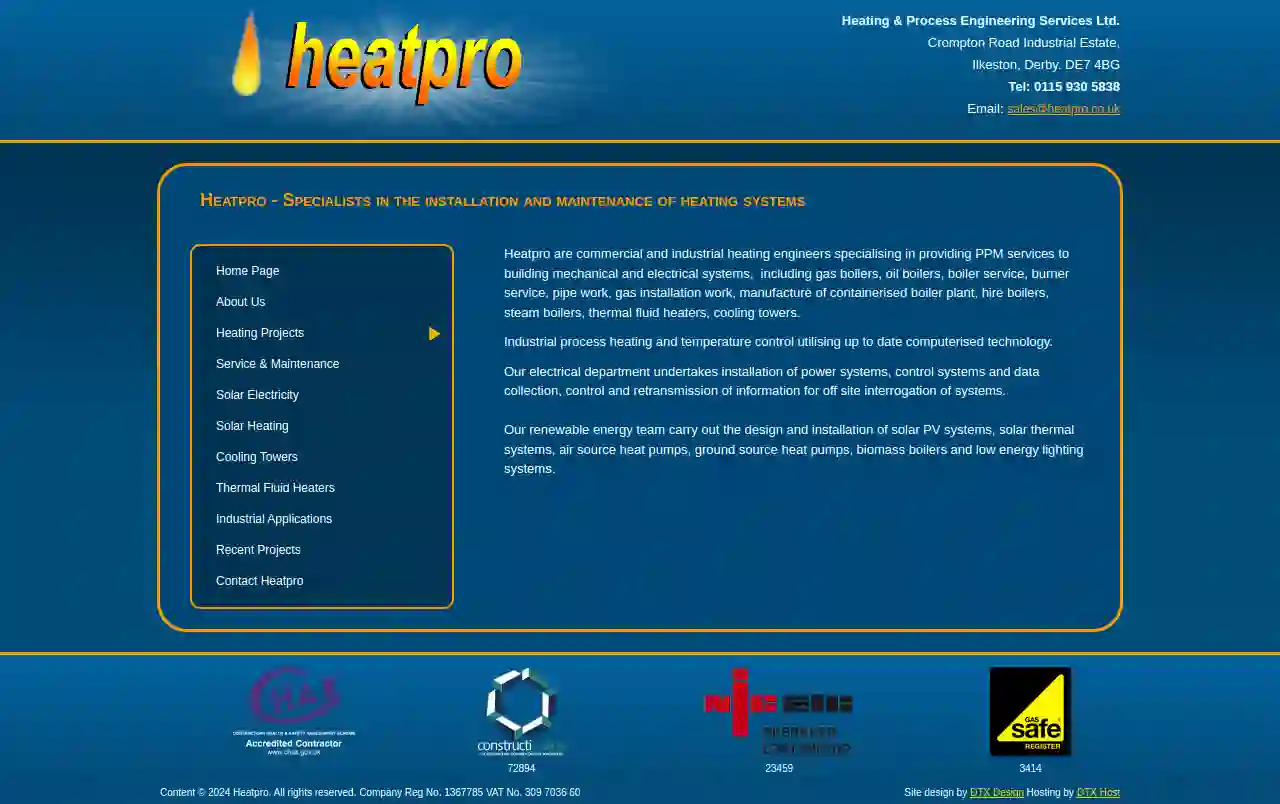
Heating & Process Engineering Services Ltd
44 reviewsIlkeston, Derby, Crompton Road Industrial Estate, DE7 4BG, GBHeating & Process Engineering Services Ltd. is a company that specialises in providing PPM services to building mechanical and electrical systems, including gas boilers, oil boilers, boiler service, burner service, pipe work, gas installation work, manufacture of containerised boiler plant, hire boilers, steam boilers, thermal fluid heaters, cooling towers. We also provide industrial process heating and temperature control utilising up to date computerised technology. Our electrical department undertakes installation of power systems, control systems and data collection, control and retransmission of information for off site interrogation of systems. Our renewable energy team carry out the design and installation of solar PV systems, solar thermal systems, air source heat pumps, ground source heat pumps, biomass boilers and low energy lighting systems.
- Services
- Why Us?
- Gallery
Get Quote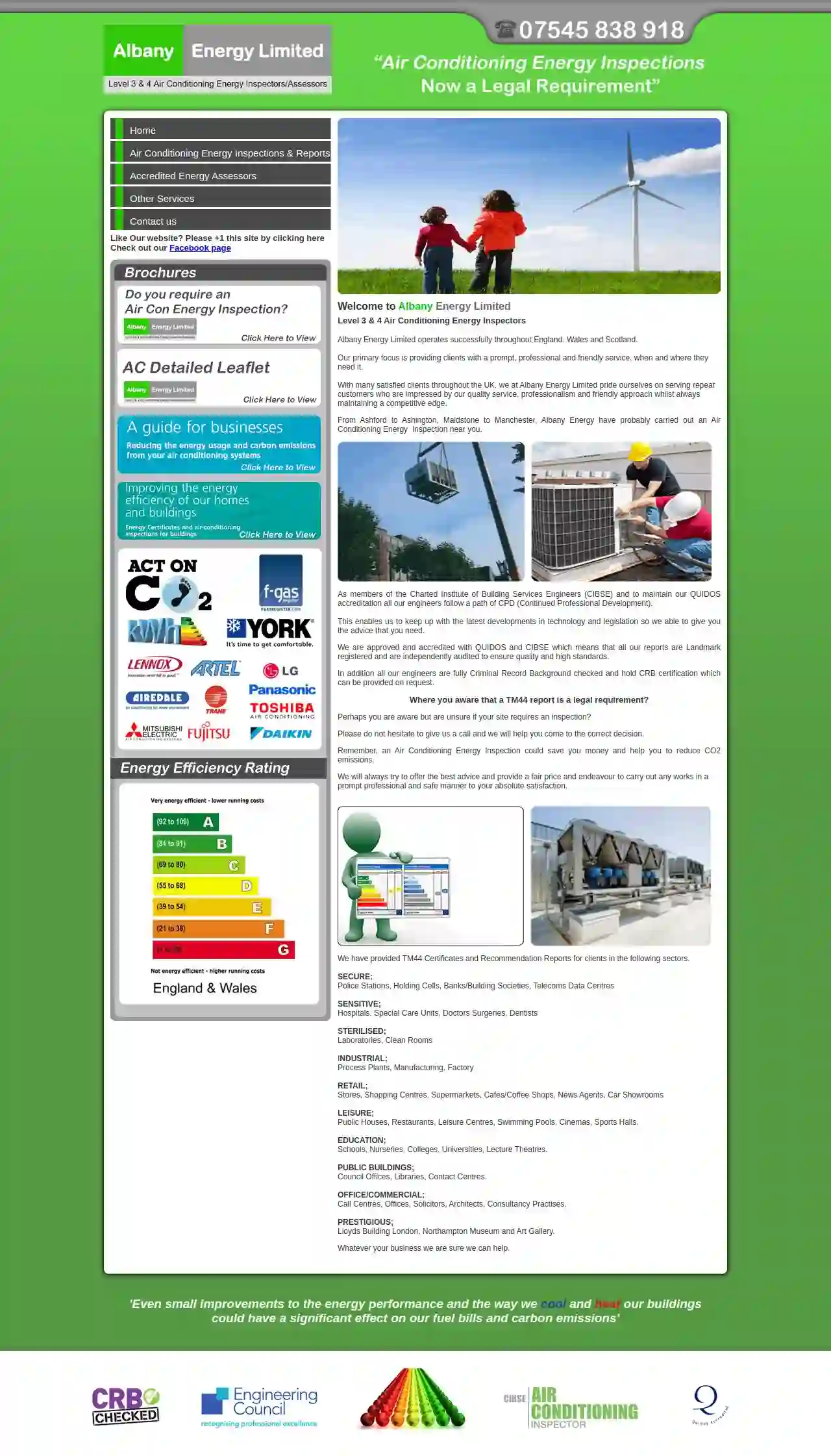
Albany Energy Limited (TM44 Air Con AC Energy Inspections)
Ilkeston, GBWelcome to Albany Energy Limited, Level 3 & 4 Air Conditioning Energy Inspectors. We operate successfully throughout England, Wales and Scotland. Our primary focus is providing clients with a prompt, professional and friendly service, when and where they need it. With many satisfied clients throughout the UK, we at Albany Energy Limited pride ourselves on serving repeat customers who are impressed by our quality service, professionalism and friendly approach whilst always maintaining a competitive edge. From Ashford to Ashington, Maidstone to Manchester, Albany Energy have probably carried out an Air Conditioning Energy Inspection near you. As members of the Charted Institute of Building Services Engineers (CIBSE) and to maintain our QUIDOS accreditation all our engineers follow a path of CPD (Continued Professional Development). This enables us to keep up with the latest developments in technology and legislation so we are able to give you the advice that you need. We are approved and accredited with QUIDOS and CIBSE which means that all our reports are Landmark registered and are independently audited to ensure quality and high standards. In addition all our engineers are fully Criminal Record Background checked and hold CRB certification which can be provided on request. Where you aware that a TM44 report is a legal requirement? Perhaps you are aware but are unsure if your site requires an inspection? Please do not hesitate to give us a call and we will help you come to the correct decision. Remember, an Air Conditioning Energy Inspection could save you money and help you to reduce CO2 emissions. We will always try to offer the best advice and provide a fair price and endeavour to carry out any works in a prompt professional and safe manner to your absolute satisfaction.
- Services
- Why Us?
- Accreditations
- Our Team
- Gallery
Get Quote
Over 12,692+ HVAC Companies registered
Our HVAC experts operate in Brimington and surrounding areas!
HVACCompaniesHub has curated and vetted the Best HVAC Businesses arround Brimington. Find the most reliable business today.